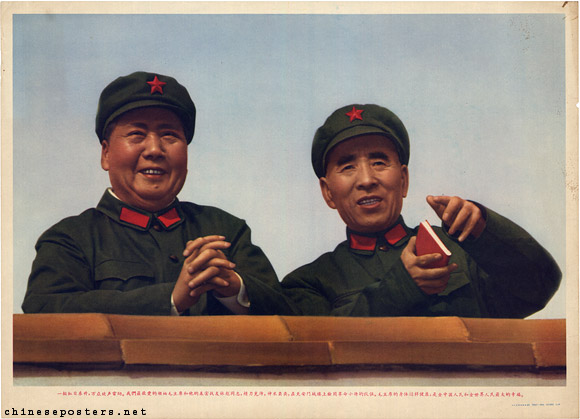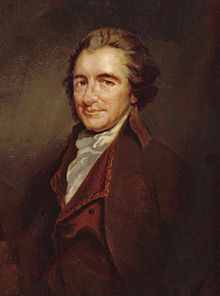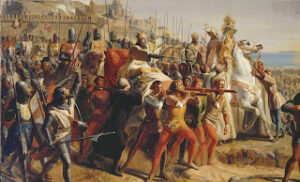Most of the time we are told stories filled with mystery, and these stories usually have a conclusion. However, some stories are filled with mystery and their conclusions are yet another mystery. This is exactly what happened with the story of Lin Biao’s death. Lin Biao was Chairman Mao Zedong’s Vice-Chairman, who was a Chinese political leader and distinguished man who achieved glory for being one of the most honorable men in China, after fighting in many battles, such as the Chinese Civil War in the 1930s and 1940s, as well as in the Cultural Revolution of the 1960s. Lin Biao deeply believed in Mao’s communist movement and was supportive of his political ideals completely. Yet, on September 13, 1971, the plane in which Lin Biao was aboard, mysteriously crashed after supposedly running out of fuel while flying over Mongolia. The Chinese reported that no person aboard the Trident 1-E aircraft had survived.1
One word from Chairman Mao is worth ten thousand from others. His every statement is truth. We must carry out those that we understand as well as those we don’t. – Lin Biao2

Lin Biao, originally named Lin Yurong, was born in Huanggang, Hubei province, China on December 15, 1907. Growing up, he was deeply affected by the differences between social classes and cultural upheavals within China. As a teenager, he became interested in the socialist and communist movement in China, and in 1923, he joined the Socialist Youth League. Lin rapidly became a well-known name in China, after being pivotal to the victory of the Chinese Civil War (1927-1950).3 But the Chinese Civil War was just the beginning of his support of the leader of the Chinese Communist Party, Chairman Mao. Years later, during the Cultural Revolution (1966-1976), he led the youthful group named Red Guards, a group known to spread Mao’s communist propaganda and cult beliefs, but unfortunately Lin Biao had died years before this came to an end. Even though, until the very last days, Lin had always supported Mao completely, becoming known as “Mao’s best student” and “closest comrade-in-arms.”4 This devotion towards Mao and his movement eventually led him to be officially named and recognized as “Mao’s heir” within the Communist Party.5 And by this point, Lin Biao had become the second most powerful man in China, second only to Mao himself.6
The mystery in Lin Biao’s death lies in the fact that, while Mao’s government accused Lin Biao of being a traitor, a report from Soviet officials who inspected the wreckage of the downed aircraft (because it had crashed on the Soviet Union’s border), reported that no body over the age of fifty was found.7 This suggested that Lin Biao had never been aboard that plane to begin with. But then, what had happened to Lin Biao? Had he been killed days before the airplane crashed? Furthermore, if there was no body found, then what explains his disappearance? Actually, it is said that Mao invited Lin Biao and his wife to a dinner at his house after finding out of his betrayal, planning to execute him. Lin Biao eventually discovered his plan while having dinner, so he fled Mao’s home. Lin Biao couldn’t manage to get away too far. In no time, his grand limousine, known as the ‘Red Flag,’ was soon being chased by Mao’s elite Security Unit 8431. Instantly, the Security Unit caught up to Lin Biao, shooting down and destroying the limousine after an altercation, in which both Lin and his wife died at the scene. Of course, this version was never revealed to the Chinese people.8

The story of Lin Biao is so mysterious because even until April 1, 1969 during the Cultural Revolution, when he was the leader of the People’s Liberation Army, Lin Biao effectively led the party. And by 1971 he was already rumored to have planned a coup leading to this death in the same year. Some historians believe that the only reason why Lin Biao disappeared was because Mao became too wary of the power Lin Biao had–but nothing has been proved nor found. 9 Furthermore, it is believed that Lin Biao had a similar fear but he feared that Mao would replace him with somebody else, instead of him being the one who would eventually inherit Mao’s position. Hence, Lin speedily planned Mao’s assassination and a coup d’etat to assume power. In spite of their many years of close comradeship, several political differences came between them. While Lin Biao preferred having an army administrating the country, Mao preferred and wanted to rebuild the Communist Party as a new power base. Therefore, by the early 1970’s, the two had drifted apart.10 Many conspiracy theories behind Lin Biao’s “Project 571” began to emerge. One theory was that Lin was not acting alone, but in collusion with his family, specifically his son Lin Liguo, who was one of the masterminds in planning the coup to establish a new government in Guangzhou, China.11 The plan was drafted and planned under the code “Project 571” as a play on words, which, if read in Chinese, is pronounced “wu gi yi” and when spoken means “armed uprising.” The project had everything coded, and Mao was mentioned under the code name “B-52.” The plan was to exploit Mao’s tour of South China and to execute him aboard his private train. However, Mao returned to Beijing safely and the plan was never carried out.12 Soon after Mao discovered their plan, Lin Biao and his family boarded a plane and attempted to flee China. Mysteriously, the airplane crashed on September 13, 1971 while flying over Mongolia, where everyone aboard died, including Lin Biao, or so it was reported by Mao’s government. But again, the Soviet’s report, upon inspecting the crash, stated otherwise.13

Thus, Lin Biao’s death continues to be vague and ambiguous. Decades after his death, the puzzle pieces are scattered, and the missing pieces continue to hinder knowing the full story of Lin Biao and whether he really did plan to assassinate or overthrow Mao. Perhaps it was solely a plan of his son Lin Luguo. But how did Lin Biao really died? Was the conspiracy of the “Project 571” real? How is it that a man who had followed Mao for so long had drafted a plan to assassinate the one person to whom Lin Biao himself had supported and fought for all his life? Due to Chinese influence and story cover-up, as well as Mao’s control in the government, no further evidence to answer so many questions can be found…and we’ll probably never know. One thing remains in history, is how the story of Lin Biao remains a tale of glory, mystery, and death.

- Orville Schell, “A Chinese Puzzle Missing Some Pieces,” The New York Times, May, 15 1983. Accessed February 21, 2019. https://www.nytimes.com/1983/05/15/books/a-chinese-puzzle-missing-some-pieces.html. ↵
- BrainyQuote, s.v. “Lin Biao”. ↵
- Encyclopedia Britannica, s.v. “Lin Biao Chinese Military Leader” by Edward J.M. Rhoads. ↵
- Encyclopedia of Modern China, 2009, s.v. “Lin Biao 1907–1971,” by David Pong. ↵
- Encyclopedia of Modern China, 2009, s.v. “Lin Biao 1907–1971,” by David Pong. ↵
- Orville Schell, “A Chinese Puzzle Missing Some Pieces,” The New York Times, May, 15 1983. Accessed February 21,2019.https://www.nytimes.com/1983/05/15/books/a-chinese-puzzle-missing-some-pieces.html. ↵
- Orville Schell, “A Chinese Puzzle Missing Some Pieces,” The New York Times, May, 15 1983. Accessed February 21, 2019. https://www.nytimes.com/1983/05/15/books/a-chinese-puzzle-missing-some-pieces.html. ↵
- Orville Schell, “A Chinese Puzzle Missing Some Pieces,” The New York Times, May, 15 1983. Accessed February 21, 2019. https://www.nytimes.com/1983/05/15/books/a-chinese-puzzle-missing-some-pieces.html. ↵
- “Lin Biao” New World Encyclopedia, July 23, 2018. http://www.newworldencyclopedia.org/entry/Lin_Biao#Attempted_coup_and_downfall ↵
- Orville Schell, “A Chinese Puzzle Missing Some Pieces,” The New York Times, May, 15 1983. Accessed February 21,2019.https://www.nytimes.com/1983/05/15/books/a-chinese-puzzle-missing-some-pieces.html. ↵
- Encyclopedia of Modern China, 2009, s.v. “Lin Biao 1907–1971,” by David Pong. ↵
- Orville Schell, “A Chinese Puzzle Missing Some Pieces,” The New York Times, May, 15 1983. Accessed February 21,2019.https://www.nytimes.com/1983/05/15/books/a-chinese-puzzle-missing-some-pieces.html. ↵
- Orville Schell, “A Chinese Puzzle Missing Some Pieces,” The New York Times, May, 15 1983. Accessed February 21, 2019.https://www.nytimes.com/1983/05/15/books/a-chinese-puzzle-missing-some-pieces.html. ↵



33 comments
Chelsea Alvarez
I am fascinated with any conspiracy or mystery story and had never heard of Lin Biao. Upon reading the first paragraph of this article, Lin Biao sounded like he was a man of honesty and integrity. It is crazy how his body was never found and there are different accounts of what might have really happened to him. I can’t imagine being betrayed by the one person that I confide in the most.
Hamza Bourouz
Nice read, I did not know about the story of Lin. I believe Mao is definitely responsible for the disapearance of Lin, fear of growing power and competition irritates authoritarian leaders who often resolve to assasination as it is a very effective way to eliminate competition even when the competition is a dear friend and a loyal follower.
Sharriah Martinez
Congrats on your nomination for a award! This was a great read from beginning to end. Like I have said in other comments I love murder mysteries, criminal minds and piecing together crimes. I had neither heard about Lin Bao and Mao Zedong. This was a very fascinating read though! I saw Lin Boa as true honest and loyal. Although there are no distinct specific evidence that links Mao to Lin’s death I still see him as being responsible.
Hali Garcia
Great article!!! I really enjoyed reading this. I do not think that I have ever heard of Mao or Lin Biao but Biao’s name does sound familiar. I love reading about mysteries like this because they always keep me on my toes. It shocked me when I read that he was reportedly killed in a plane crash but then the Soviet Union said there was no one in his age category on the plane. Congratulations on your nomination!!!
Christopher Hohman
Nice article. I have never heard of Lin Biao before, although I have heard of Mao. It does not surprise me at all that these men wanted to kill each other. After all, it seems like their ideas drifted apart after many years of working closely with each other. However, it is really interesting that there are two different versions of Lin’s death. The Chinese reported that he had died in a plane crash while the Soviets contradicted that conclusion. Very ambiguous indeed. Congratulations on your nomination Fatima.
Sydney Aleman
I love watching and reading mysteries of pretty much anything from 9/11 to aliens. I have never read anything about Lin Biao, but his death is certainly a mystery. Just by reading this article I already have so many questions, but that will have to wait for later. This was truly a great article to read and now I am going to look up some videos if they have any on Lin Biao.
Mariah Cavanaugh
The story of Lin Biao had me on the edge of my seat. In the beginning of your article you stated that the conclusion the Lin Biao saga would only leave more unanswered questions. You were frustratingly correct! I’m fascinated by the fact that so many years later we still don’t have answers to his actual cause of death. This was a wonderful article!
Sarah Uhlig
This article had me hooked on reading it just from the title and the images that went with it. I like reading about murder mysteries and how they are solved. This article describes a very mysterious situation about this man and how he had been murdered and I feel that maybe there should be more evidence to prove that his friend had really been the murderer. I really enjoyed reading this article. Congrats on your nomination.
Thomas Fraire
This article was very well researched and I loved the way this story was told. Throughout history everyone loves a murder mystery I do think that Mao had something to do with his death. I love Chinses history for reasons like this there is always so much drama and its really interesting! It is like a live telenovela.
Rosario Moreno
I feel that something shady was going on at this time, when I was reading this article, I know that there was no factual evidence proving that Mao Zedong was responsible for killing his loyal friend, but it was very fishy that Lin Bao was under his care. Overall I think you did a wonderful job explaining the story. I also, loved the pictures you used.